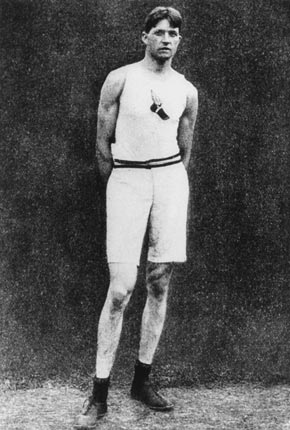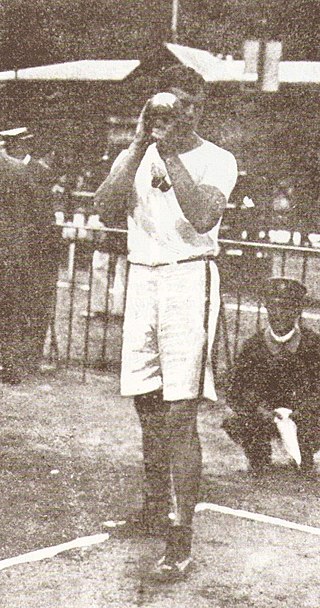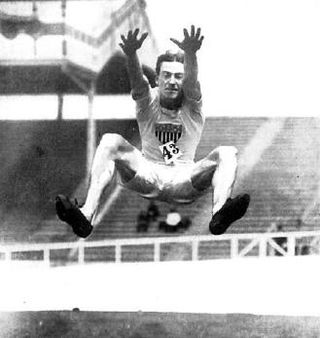
At the 1896 Summer Olympics, the first modern Olympiad, twelve athletics events were contested. A total of 25 medals were awarded. The medals were later denoted as 37 modern medals. All of the events except the marathon were held in the Panathinaiko Stadium, which was also the finish for the marathon. Events were held on 6 April, 7 April, 9 April, and 10 April 1896. Altogether, 63 athletes, all men, from nine nations competed. This made athletics the most international of the nine sports at the 1896 Games.

At the 1900 Summer Olympics, twenty-three athletics events were contested. Altogether, 117 athletes from 15 nations competed. A total of 68 medals were awarded. In many countries, due in part to the conflation of the Olympic Games and the World's Fair in Paris, the media discussed only the athletics events under the "Olympic" name while ignoring the incredible variety of other sports featured at the time.

At the 1900 Summer Olympics one gymnastics event for men was contested. The competition was held on Sunday, 29 July 1900, and on Monday, 30 July 1900. There were 135 competitors from 8 nations. The top 18 places were taken by French gymnasts, of which there were more than 100. The event was won by Gustave Sandras, with Noël Bas finishing second and Lucien Démanet third. The highest-placing foreign gymnast was Jules Ducret of Switzerland, in a tie for 19th place.

The men's 1500 metres was a middle-distance running event on the athletics programme at the 1900 Summer Olympics in Paris. It was held on July 15, 1900. The race was held on a track of 500 metres in circumference. Nine athletes from six nations competed. The event was won by Charles Bennett of Great Britain, the nation's first medal in the brief history of the event.

The men's high jump was a track & field athletics event at the 1900 Summer Olympics in Paris. It was held on July 15, 1900. Eight athletes from seven nations competed in the high jump. The event was won by Irving Baxter of the United States, the nation's second consecutive victory in the men's high jump. Great Britain and Hungary each took medals in their first appearance in the event.

The men's pole vault was a track & field athletics event at the 1900 Summer Olympics in Paris. It was held on July 15, 1900. Eight athletes from five nations competed in the pole vault.

The men's long jump was a track & field athletics event at the 1900 Summer Olympics in Paris. It was held on July 14 and July 15, 1900. 12 athletes from six nations competed. The event was won by Alvin Kraenzlein of the United States, the second consecutive victory for the American team. Myer Prinstein, also an American, took silver. Patrick Leahy, an Irish athlete competing for Great Britain, took bronze; it was the first long jump medal for a non-American athlete as the United States had swept the 1896 medals.

The men's standing long jump was a track & field athletics event at the 1900 Summer Olympics in Paris. It was held on July 16, 1900. Four athletes from two nations competed in the standing long jump. The event was won by Ray Ewry of the United States, with his teammate Irving Baxter the runner-up; the two dominated all three of the standing jumps in 1900, finishing first and second in each. Ewry would take gold medals in all eight standing jump events from 1900 to 1908. The bronze medal was won by Émile Torchebœuf of France.

The men's standing triple jump was a track & field athletics event at the 1900 Summer Olympics in Paris, France. It was held on July 16, 1900. 10 athletes from four nations competed in the standing triple jump. The event was won by Ray Ewry of the United States, who took gold in all three of the standing jumps in 1900. His teammate Irving Baxter earned silver in all three 1900 standing jumps. The American sweep was completed with Robert Garrett taking bronze.

The men's shot put was a track & field athletics event at the 1900 Summer Olympics in Paris. It was held on July 14 and July 15, 1900. 11 shot putters from five nations competed. The event was won by Richard Sheldon of the United States, the nation's second consecutive victory in the men's shot put. Josiah McCracken took silver and Robert Garrett took bronze, completing an American medal sweep.

The men's discus throw was a track & field athletics event at the 1900 Summer Olympics in Paris. It was held on July 14 and July 15, 1900. 17 discus throwers from nine nations competed. The event was won by Rudolf Bauer of Hungary, the nation's first victory in the men's discus throw. František Janda-Suk gave Bohemia its first medal in the event, also in that nation's first appearance. Richard Sheldon's bronze put the United States in the top three for the second consecutive Games.

The men's hammer throw was a track & field athletics event at the 1900 Summer Olympics in Paris, the discipline's first Olympic appearance. It was held on July 16, 1900. Five hammer throwers from two nations competed. The event was won by John Flanagan of the United States, the first of his three consecutive victories in the hammer throw. The American team swept the medals, with Truxtun Hare finishing second and Josiah McCracken third.

MyerPrinstein was a Polish American track and field athlete who held the world record for the long jump in 1900 and won four gold medals in three Olympic Games for the long jump and triple jump. He was a member of the Irish American Athletic Club in Queens, New York. A 1902 law graduate and track team captain for Syracuse University, after college he became a New York real estate lawyer and businessman while living in Jamaica Plains, Queens. To date, he is the only Olympic track athlete to win both the triple and long jump in the same Olympics, earning the distinction in St. Louis in 1904.

The men's long jump was one of six jumping events on the Athletics at the 1908 Summer Olympics programme in London. The competition was held on July 22, 1908. Thirty-two athletes from 9 nations competed. NOCs could enter up to 12 athletes. The event was won by Frank Irons of the United States, the nation's fourth consecutive victory in the first four Olympic Games. Calvin Bricker of Canada took bronze to break up the Americans' attempt at another sweep.
Patrick Joseph Leahy was an Irish athlete who won Olympic medals in the high jump and long jump at the 1900 Summer Olympics.

The men's long jump was a track and field athletics event held as part of the athletics at the 1904 Summer Olympics programme. It was the third time the event was held. Nine athletes from three nations participated. The competition was held on Thursday, September 1, 1904.

The men's triple jump was a track and field athletics event held as part of the athletics at the 1904 Summer Olympics programme. It was the third time the event was held. Seven athletes, all from the United States, participated. The competition was held on Thursday, September 1, 1904.

The men's triple jump was an event at the 1956 Summer Olympics in Melbourne, Australia. The event was also known at the time as the hop, step and jump. Thirty-two athletes from 20 nations competed. The maximum number of athletes per nation had been set at 3 since the 1930 Olympic Congress. The event was won by Adhemar da Silva of Brazil, successfully defending his 1952 title. He was the second man to do so, after Myer Prinstein in 1900 and 1904. Vilhjálmur Einarsson won Iceland's first Olympic medal in any event with the silver in this competition. Vitold Kreyer put the Soviet Union on the men's triple jump podium for the second Games in a row with his bronze.

The long jump at the Summer Olympics, is grouped among the four track and field jumping events held at the multi-sport event. The men's long jump has been present on the Olympic athletics programme since the first Summer Olympics in 1896. The women's long jump was introduced over fifty years later in 1948, and was the second Olympic jumping event for women after the high jump, which was added in 1928.

The triple jump at the Summer Olympics is grouped among the four track and field jumping events held at the multi-sport event. The men's triple jump has been present on the Olympic athletics programme since the first Summer Olympics in 1896. The women's triple jump is one of the more recent additions to the programme, having been first contested in 1996. It became the third Olympic jumping event for women after the high jump and long jump.



















